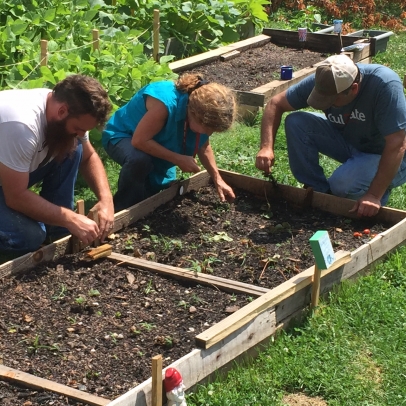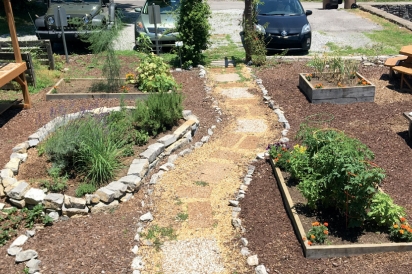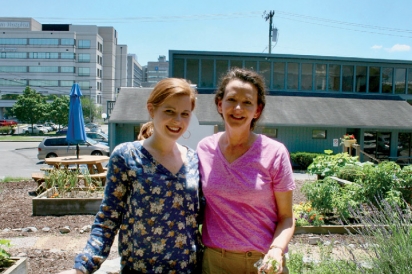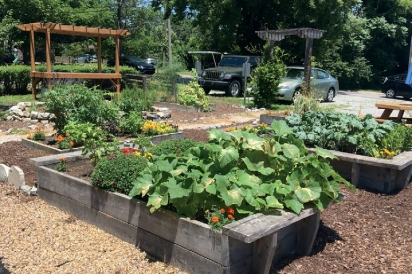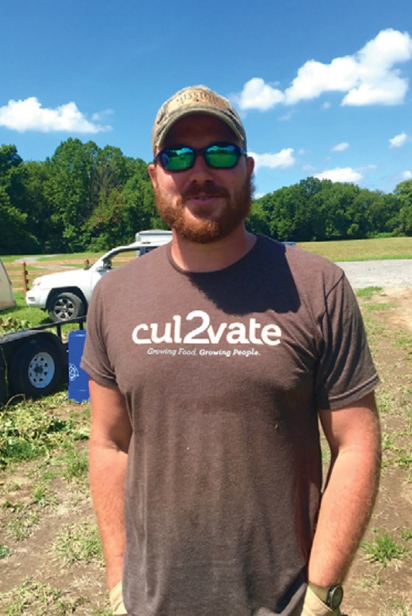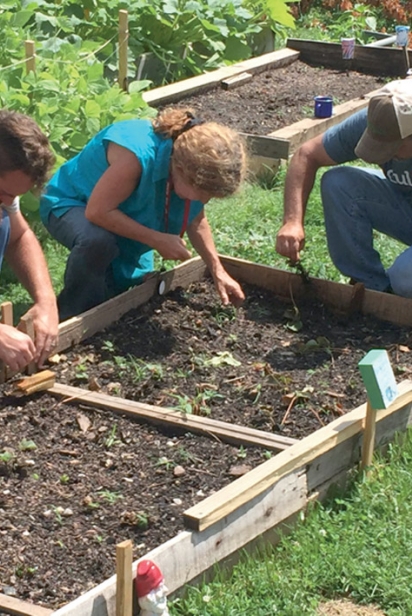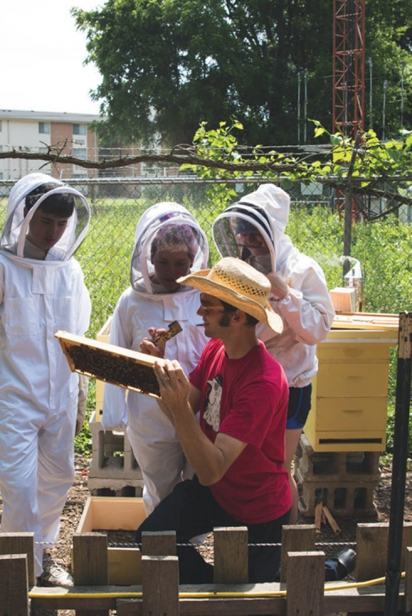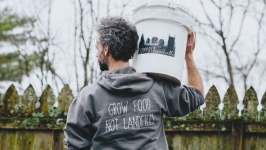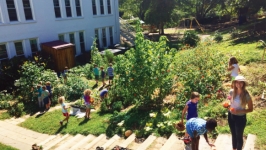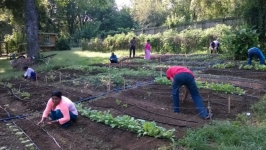Three Gardens That Give Back
Faith Family Medical Center
Just beyond the concrete puzzle of St. Thomas, Tristar and Centennial Medical Centers on 21st Avenue North, lies a lush green space where medicine and gardening meet. Since 2001, Faith Family Medical Center has been providing low-cost, top-notch healthcare to the uninsured. But in 2014 their mission expanded to more fully integrate diet into their holistic wellness approach. This came in the form of a community garden with a grant from the Blue Cross Blue Shield of Middle Tennessee and a partnership with Gardens of Babylon and the Garden Club of Nashville.
Beth Allen, registered dietitian and Director of Faith Family’s Journey to Health program (J2H) is finding ways to help patients through food and exercise education. She says the community garden serves as the perfect platform to show how diet affects their health. Many of her patients are wary of the idea of “healthy” cooking and gardening, but in the J2H program, Beth teaches them how to read food labels and prepare balanced meals. Patients work in the garden through the entire season, and from planting to harvest begin to see food as more than just packaged goods.
Alicia Bell, Associate Director of Development, describes the garden as “a kind of welcome mat to bring people over from the clinic to the Journey to Health program.” People love being able to leave a medical appointment and walk across the parking lot to the garden to harvest as they please. Alicia says Beth is always running out to greet a patient or passerby wandering through. Though she has no formal agricultural experience aside from working in her father’s garden as a child, Beth is an enthusiastic learner—always buying exotic herbs to plant (the newest one, cuban oregano, was used in the lunch she prepared for us in the J2H kitchen) and she’s a natural at seamlessly integrating the garden into concepts her patients can apply to their wellness journey.
With seven wooden beds, the variety of vegetables and fruits is extensive; the garden is even home to a Serviceberry Tree, which bears fruit described as “a cross between a blueberry and a raspberry.” Standing guard over the garden and medical center, it seems aptly named. An even better name? The giving tree. Every day, patients leave with dirt on their hands, a bag-full of homegrown produce and a fresh outlook on how to tend to their health from the inside out.
Cul2vate: Growing Food, Growing People
Charlie Coffey had 100 pounds of squash to give away. So he loaded it up on his truck, picked up his buddy Robert, and took a drive. They gave some to the homeless on the road, then dropped some off at The Nashville Food Project, then brought the rest to The Green Hills Grille to sell to Cassie, the chef. Charlie Coffey volunteers with Cul2vate, a new garden program that gardens to supply food and teach job skills to those in need.
The Cul2vate gardens, launched in 2015, are located on a plot of land at The Ellington Agricultural Center. It’s a faith-based, but nondenominational 501C3 (nonprofit) program. Executive director, Joey Lankford modeled it after a program he worked at through a mission in South Africa. Cul2vate works like this: Grow food, give away half to those in need, then sell half to pay and train gardeners. The gardeners? Men and women down on their luck, who are frequently in various stages of addiction recovery. In addition to farm skills they get training in life skills, nutrition, and spiritual development. Last year they graduated their first two gardeners; Chris Comstock and Jack Pook. Chris now grows his own food in his own greenhouses and is working on a model program for future graduates of Cul2vate. Jack works in the lawn and garden department at Home Depot. They graduated three “cul2vators” this year, (Kent Parsons, Wendell Taylor and Bryson Keeter) and have five starting this July.
When we visited the garden, we were greeted by Matt Worley, Operations Director. Matt helps direct the program which now has four hydroponic greenhouses (all growing Roma tomatoes) and an acre and a half of gardens. The plan is to give away half of the Romas to Nashville Food Project, One Gen Away and refugee communities. The other 50% is sold at Creive Hall and Woodbine farmers markets and to Taziki’s, Green Hills Grille and Subculture Cafe on Nolensville.
Trevecca Urban Farm
Trevecca Nazarene University looks like any other university—that is, until you stumble upon the baby goats. Indeed, foraging the campus outskirts are baby goats along with a magical urban garden. Jason Adkins, the farm’s founder is incredibly passionate about teaching volunteers, students and the immediate community about how urban farming works. (He had me in a bee suit the second time we met.) He’s been sharing urban agriculture with the surrounding community (off Murfreesboro road) since the farm’s founding in 2011. The farm is home to goats, bees, pigs, chickens, and an orchard, herb garden, and formidable greenhouse complete with a hydroponic growing system.
The farm provides opportunities for barn dances, goat yoga and children’s summer camps (including a bee camp and urban farm camp). During the camps, Adkins teaches middle and high school students from the surrounding areas all about the food system, how to plant trees, make a garden and ultimately become leaders and activists in the environmental communities. They have had over 500 high school youth volunteers at the farm, many of whom, Adkins says, “go on to become docents for those who come after them to work at the farm.” They are equipped to be educators about food safety in food deserts and many aspects of urban farming. The Trevecca Urban Farm works closely with the university students as well, particularly those studying Social and Environmental Justice. Adkins and those involved in the Urban Farm are intent on encouraging the youth of today how to grow their own good food be thoughtful stewards of the land.
Other Gardens that Give
Chop Wood Carry Water
Farm that provides fresh produce for families living with special needs and to all Metro Nashville Public School teachers.
Nashville Food Project
Gardens that supply the nutrient rich foods the project prepares for their community in need. The NFP has 2 gardens: Woodmont Garden and the Wedgewood Urban Garden Thenashvillefoodproject.org
Brooklyn Heights Community Garden
Unites residents through the experience of producing life-sustaining vegetables, fruits and herbs.
Hands on Nashville Urban Farm
Volunteers provide produce harvested to The Nashville Food Project and learn gardening skills.
Farm in the City
Public garden located on vacant land adjacent to the J. Henry Hale Apartments. Provides space for urbanites to grow local food and enjoy the green space.


